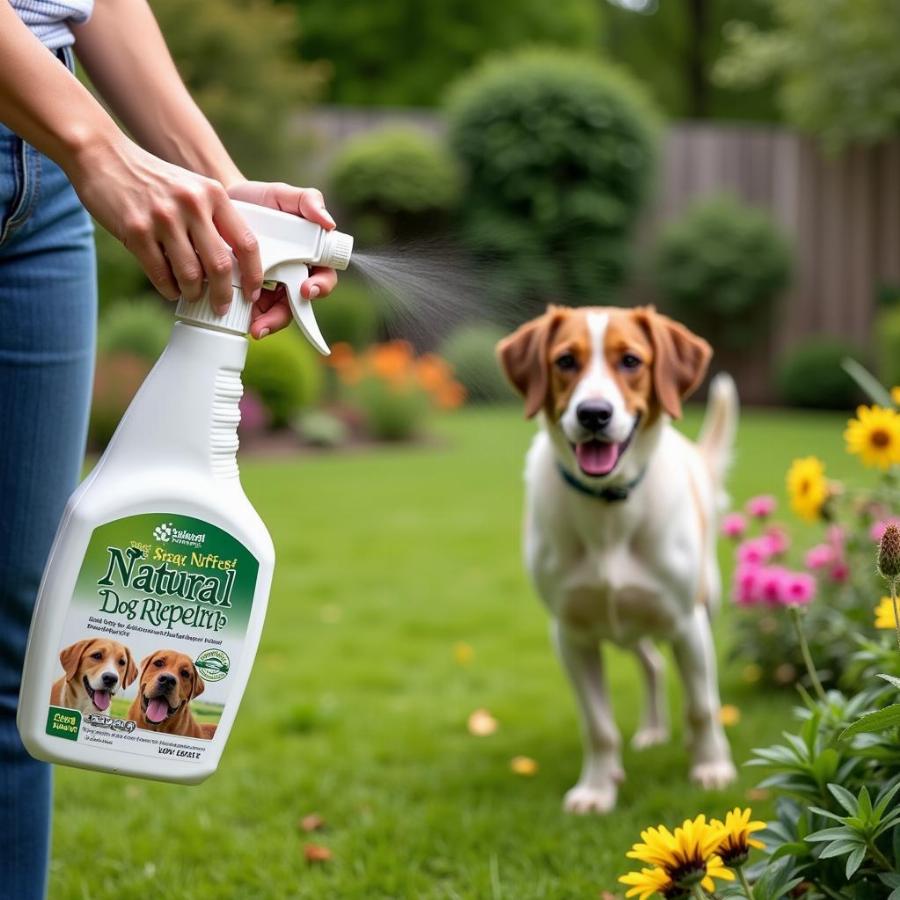Understanding which scents dogs hate can be crucial for training, managing behavior, and creating a comfortable environment for your furry friend. While dogs possess an incredible sense of smell, certain odors are unpleasant, even irritating, or can trigger negative associations for them. This article delves into the world of scents dogs hate, exploring why they dislike these smells and how you can utilize this knowledge responsibly.
Unveiling the Nose Knows: Why Certain Scents Repel Dogs
Dogs experience the world through their noses, and their olfactory senses are far more acute than ours. What might seem like a faint scent to us can be overwhelming and even painful for a dog. This heightened sensitivity explains why certain strong or pungent odors are naturally repulsive to them.
The Science Behind Canine Olfaction
A dog’s nose contains millions more olfactory receptors than a human’s, allowing them to detect a wider range of scents and at much lower concentrations. This explains why some seemingly innocuous smells, like citrus fruits, can be offensive to some dogs.
Learned Aversions: Negative Associations with Specific Scents
Beyond natural dislikes, dogs can develop aversions to smells through negative associations. For example, if a dog becomes carsick after smelling a particular air freshener, it might associate that scent with nausea and avoid it in the future.
Common Scents Dogs Dislike
Several scents are commonly known to be unpleasant for dogs, ranging from household cleaners to certain spices and fruits.
- Citrus Fruits: The potent smell of oranges, lemons, and grapefruits can be irritating to a dog’s sensitive nose. Many cleaning products contain citrus oils, making them a double whammy for some dogs.
- Vinegar: While some use diluted vinegar for cleaning, the acidic smell can be overpowering for dogs.
- Chili Peppers: Capsaicin, the compound that gives chili peppers their heat, can cause significant discomfort to a dog’s nose and even trigger respiratory irritation. Never expose your dog directly to chili peppers.
- Ammonia-Based Cleaners: The strong fumes of these cleaners can irritate a dog’s respiratory system. Always ensure proper ventilation when using such products.
- Mothballs: Naphthalene, the main ingredient in mothballs, is toxic to dogs. Keep them far out of reach.
Utilizing Scent Aversion for Training and Behavior Modification
scents dogs hate can be strategically used for training, especially for deterring unwanted behaviors like chewing or digging. However, it’s crucial to use this method responsibly and humanely.
Dog Repellents: Choosing Safe and Effective Products
Many commercial dog repellents utilize scents dogs dislike to deter them from specific areas or objects. When selecting a repellent, always choose products made with natural ingredients and avoid those containing harsh chemicals that could harm your dog.  Dog repellent spray for outdoor use
Dog repellent spray for outdoor use
Training with Scents: Positive Reinforcement Over Punishment
While scent aversion can be a helpful tool, it’s essential to prioritize positive reinforcement techniques in training. Rewarding desired behaviors is generally more effective and builds a stronger bond with your dog than relying solely on punishment.
Can Dogs Have Hot Sauce? Absolutely Not!
can dogs have hot sauce is a common question, and the answer is a resounding no. Hot sauce contains capsaicin, which can cause severe digestive upset and pain for dogs.
What Do Dogs Hate? More Than Just Smells
what do dogs hate encompasses more than just scents. Dogs can also dislike certain sounds, textures, and situations. Understanding these aversions can help you create a more positive environment for your pet.
Why Do Dogs Hate When You Blow in Their Face?
why do dogs hate when you blow in their face is due to the intensity of the sensation. The concentrated burst of air can be overwhelming and even painful for their sensitive noses. It’s best to avoid this behavior and interact with your dog in ways they find pleasant.
Conclusion
Understanding scents that dogs hate allows you to create a more comfortable and safe environment for your canine companion. While scent aversion can be a useful tool for training and behavior modification, it’s essential to prioritize positive reinforcement and always use safe and humane methods.
FAQ
-
What are some common household scents that dogs hate? Citrus, vinegar, and ammonia-based cleaners are common household scents dogs dislike.
-
Can I use scents to train my dog? Yes, but use them responsibly and in conjunction with positive reinforcement.
-
Is it safe to use commercial dog repellents? Choose repellents with natural ingredients and avoid harsh chemicals.
-
What should I do if my dog ingests something with a scent they hate? Contact your veterinarian immediately.
-
Are there any other things besides scents that dogs hate? Yes, dogs can also dislike certain sounds, textures, and situations.
-
How can I make my home more comfortable for my dog, scent-wise? Use dog-friendly cleaning products and avoid using strong air fresheners or perfumes.
-
Can I use essential oils around my dog? Many essential oils are toxic to dogs. Consult with your veterinarian before using any essential oils around your pet.
Beaut Dogs is your one-stop resource for all things related to dog care. We provide expert advice and information on a wide range of topics, from breed selection to nutrition and training. When you need support, contact Email: [email protected] to have Beaut Dogs answer in detail and accurately. Visit us at https://beautdogs.com today to learn more!